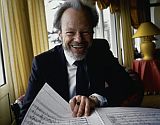
His compositional work: After the Second World War, Cerha was in close contact with the Art Club and due to his avant-garde aspirations, he received insight into the views of Schoenberg by Joseph Polnauer and at the same time played the works of his colleagues from diverse composition classes as a violinist. When he got acquainted with the current methods of composition in 1956 to 1958 at the Darmstadt summer courses, he was very interested in serialism, as well as in John Cage’s chance operations. And so Cerha, who constantly questioned power structures and allegiances, did not join any school, but worked out different methods of composition, altered them according to his own ideas and let them flow into his work. In compositions, like “Netzwerk” [in English: network] (1981), based on “Exercises” (1962-67), he lets the heterogeneity of styles exist side by side and combines avant-garde major parts with historically backward-looking subrogation. In other works such as „Spiegel I-VII“ [in English: Mirror I-VII] (1960-72), he refers to a compositional method, which either forms static structures or continuously follows the musical momentum. The rise and fall of the orchestral sound in “Spiegel VII” [in English: Mirror VII] creates a powerful, seemingly organically evolving continuum of sound – sound masses, which can also be found in “Fasce” or „Mouvements“. Despite the stylistic variety of compositional means, Cerha’s works are combined by comprehensibility. It is the continuous swaying of tension, the development of singular or multiple overlapping lines which characterize the individual compositions and always manage to arouse the curiosity.

But composing alone is not enough for Cerha. Inspired by the impressions in Darmstadt, Cerha founded in 1958 with Kurt Schwertsik the ensemble “die reihe” [in English: the series]. The name of the ensemble says it all, it didn’t stick to one performance, the goal was the continuous dissemination of contemporary music. And so they offered the Viennese public works of classical modern music as well as more recent compositions – always quite confrontational, for example the performance of the Piano Concerto by John Cage, which turned into a veritable scandal. But even this could not bring the ensemble down and so it still exists to this day. In the 1980s Cerha initiated together with Hans Landesmann the concert series “Wege in unsere Zeit” [in English: ways in our time] in the Konzerthaus Vienna, which again gave the public the opportunity to get familiar with the contemporary music scene. The fact that Cerha is not limited to one style is not only valid for his compositions, but also for his career as a conductor. Thus, while working for the ensemble “die reihe”, he was also engaged in conducting the ensemble “Camerata Frescobaldiana”, which performed works of the early Italian Baroque on period instruments.
Even with 85 years, Cerha is still active and dedicated to his creative work at his country home in Maria Langegg, where he has erected a chapel. The composer with diverse interests not only writes music, but is also active as a painter and sculptor. Another passion is – just like some other fellow composers – mushroom hunting, where he finds peace for his other activities. In this sense, we hope it will stay this way for a long time.
Doris Weberberger
translated from the German by Doris Miyung Brady
http://www.friedrich-cerha.com/home.php?page=intro,6,1,00,46,00,00,1,46
https://db.musicaustria.at/node/51908
